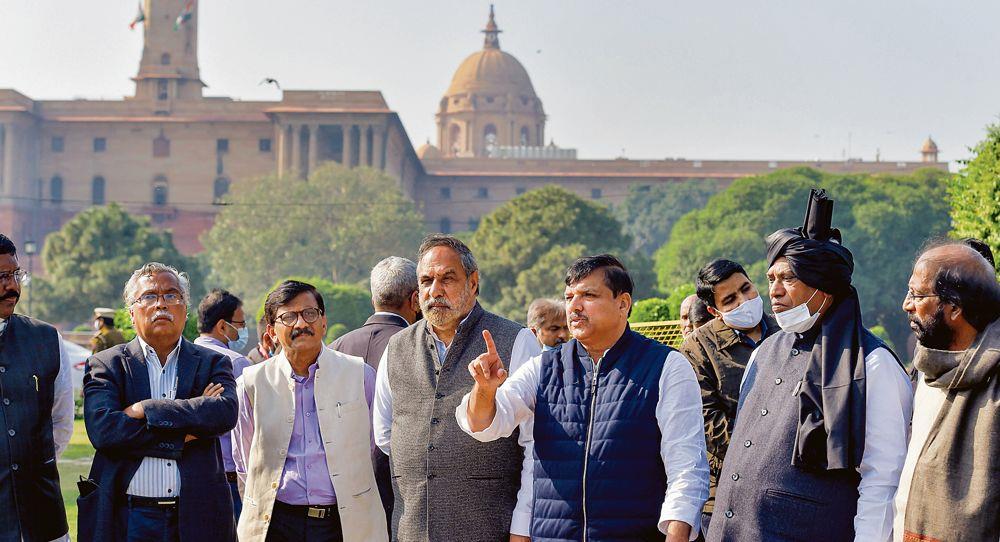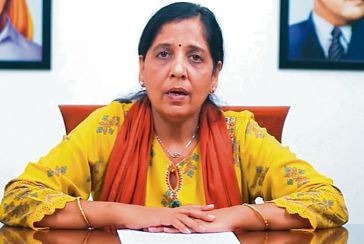
Challenging BJP: If Hindutva is wished away, the Opposition must willy-nilly focus on governance and policies. PTI
Radhika Ramaseshan
Senior journalist
A deliberation on the Opposition regrouping sans the Congress, christened as a ‘third front’ or a ‘secular, democratic coalition’, or whatever, is invariably governed by numerous caveats which have arisen from past experience with such experiments. Prime among the riders are which party would steer a formation of the disparate forces against the near-hegemonic BJP, and critically, who would lead it and not so much on who would arbitrate the contradictions and straighten out the creases. The individual has become significant in the era of presidential politics ushered in a parliamentary system by the BJP.
With two years to go for the next Lok Sabha elections and a heap of decisive Assembly elections to negotiate, the Opposition still has the time, energy and temptation to debate on a prospective front, without the Congress, which on its part, has not inspired hope and confidence about its credentials to be the leader. There are too many threads running asymmetrically through the fabric that makes up an Opposition coalition. So many, that it’s arduous to make sense of the skein right now.
It’s equally premature to dismiss the notion of a joint front as a fantasy or a non-starter because most of the potential stakeholders would want an alternative to the BJP at the Centre, given their none-too-happy engagements with it in their states. The question is: where does the endeavour begin — in a state election or Parliament?
It says something for the BJP’s persistence at undermining Parliament’s salience and gravity that the Opposition has been unable to use the institution to confront and corner the government as effectively as it did with the support of a powerful breakaway group from the Congress, in 1989, in the Lok Sabha.
In the last winter session, the Trinamool Congress Party (TMC), that fancies itself as the pivot of a non-Congress Opposition, refused to engage with the Congress, a gesture that was reciprocated by Sonia Gandhi, who did not invite the TMC to a meeting of the Opposition. The result was the absence of a bulwark of resistance against the BJP, although the Opposition was not strapped for issues.
In the jumble that followed, the Telangana Rashtra Samithi (TRS) — which leaned more on the BJP until recently — reached out to the Dravida Munnetra Kazhagam (DMK) in what seemed like the beginning of a southern confederation, but the initiative fizzled out. The DMK is a Congress ally, just like the Shiv Sena, which for better or worse, relies on the Congress to prop up its Maha Vikas Aghadi government in Maharashtra. The Sena made it clear that it did not take kindly to the TMC’s ambitions to joust with the Congress nationally.
The crucial difference between the regional parties of yore and now is that most state satraps harbour national ambitions — apparently a fallout of Narendra Modi’s ascendancy and success. As the Gujarat chief minister, Modi was another regional chieftain of the BJP on a par with, say, Madhya Pradesh’s Shivraj Singh Chouhan. He was part of a strong party infrastructure backed by the RSS and could realise his larger aspirations after a few bottlenecks. Modi’s refrain of how a ‘humble’ person like him, without the ‘advantages’ of pedigree, could make it to the topmost job, ostensibly fanned the yearnings of other chief ministers, prominently that of the TMC head, Mamata Banerjee.
Doubtless, Mamata fought the BJP hard in the West Bengal Assembly elections and won a well-earned victory. Her soaring ambitions have since taken her to Goa in the west and Tripura and Assam in the east.
If the goal of the regional parties is to fight and win elections and project themselves as serious stakeholders in the national sweepstakes without holding corresponding political capital, can the competing hunger make for Opposition unity?
It conjures the image of a crowded, noisy marketplace populated with self-seeking individuals. The fire in the belly is understandable because without it, a good fight can’t be staged; but it isn’t the only route or the most desirable one to upstage a ruling party.
The Opposition constituents are bereft of a larger programme to take to the voters, or a big idea which can challenge the BJP. Remember the BJP was not birthed to just appropriate political power; it has to sub-serve the RSS, the ideological fountainhead. Federal interests are fine and the regional Opposition must strive to get its rights from the Centre. On a national canvas, can dots of federal entities make up a whole?
So, what is that big idea the Opposition has to search for? Secularism served its purpose in letter and spirit when the United Front coalition came into being after the 1996 elections. The BJP’s Hindutva narrative had not washed out other beliefs and programmes. With notable exceptions, the discourse today is about minority baiting and hating and crafting vicious ways of painting Muslims and Christians into a corner and victimising Dalits every now and then. The Opposition understandably tiptoes on the Hindutva terrain, and in cases, acquiesces to the agenda of religious polarisation and redefined ‘nationalism’.
If Hindutva is wished away, the Opposition must willy-nilly focus on governance and policies. The Centre’s pandemic management left much to be desired and its cavalier approach is manifest once again as the country is up against a fresh wave. Can the states ruled by the regional parties claim that their own records surpass that of the Centre? Maharashtra, governed by two regional forces, the Sena and the Nationalist Congress Party, with the Congress as a minor partner, is inevitably the worst hit and it struggles the hardest and longest.
Before talking of ‘fronts’, it is incumbent upon the Opposition to look within, glean lessons from the past, iron out the contradictions, and importantly, decide if the Congress must be part of the endeavour.
Join Whatsapp Channel of The Tribune for latest updates.



























